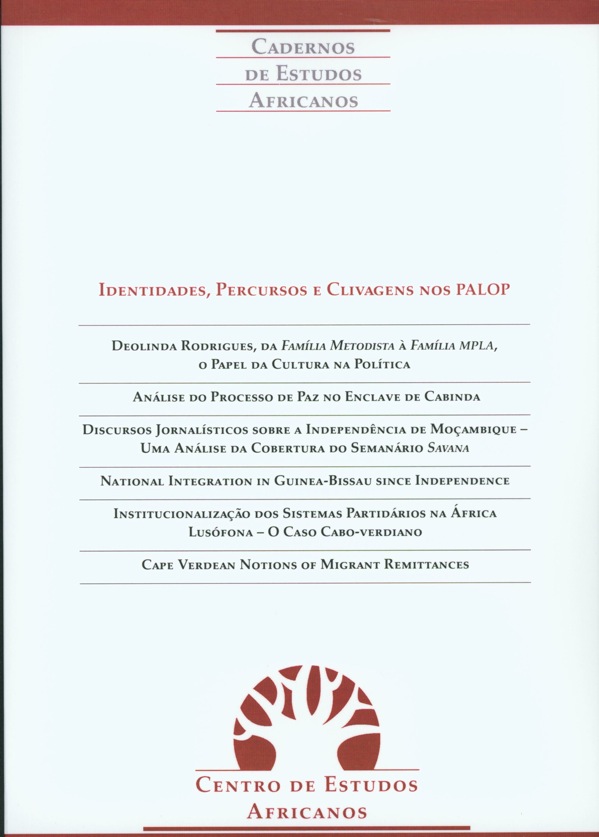Cape Verdean Notions of Migrant Remittances
DOI:
https://doi.org/10.4000/cea.168Palavras-chave:
Cape Verde, migrant remittances, transnational relations, moral, country of originResumo
The transfer of money from migrants to their non-migrant relatives is a key, symbol of the quality and meaning of transnational kinship relations. This article analyses how people in Cape Verde view migrant family members’ economic obligations and it examines the concomitant moral discourse. Through a detailed ethnographic study the article explores how gender and kinship positions interplay with the moral obligation to send remittances, and it also inquires into the differences between rural and urban people’s attitudes towards monetary gifts. Moreover, the importance of the receiver’s status in the local society is discussed and the role of the personal relation between the sender and the receiver. Thus the analysis goes beyond an instrumental and rationalistic approach to remittances, which is common in much research, and explores the significance of this money for emotions and social relations.Referências
Åkesson, Lisa (2009). Remittances and inequality in Cape Verde: The impact of changing family organization, Global Networks, 9 (3), 381-398.
DOI : 10.1111/j.1471-0374.2009.00259.x
Åkesson, Lisa (2004). Making a life: Meanings of migration in Cape Verde. Ph.D. dissertation, University of Gothenburg.
Banco de Cabo Verde (2008a). Alguns indicadores da economia cabo-verdiana (www.bcv.cv/_conteudo/estatistica/quadros/quadrosintese.xls [2008-06-24]).
Banco de Cabo Verde (2008b) Remessas de emigrantes por países de origem (www.bcv.cv/_conteudo/estatistica/quadros/quadro3.2.5.xls [2008-06-24]).
Bourdet, Yves (2002). Cape Verde: From aid dependency to self-sustaining growth? Country Economic Report 2002, 3. Stockholm, Sida.
Carling, Jørgen (2008). The human dynamics of migrant transnationalism, Ethnical and Racial Studies, 31 (8), 1452-1477.
Country Watch (2008). Cape Verde Country Review 2008 (www.countrywatch.com [2008-06-25]).
Eastmond, Marita (2007). Familjens välfärdsprojekt: Att återskapa hem och vardagsliv på flera plaster, in Eastmond, M. and L. Åkesson, Globala familjer: Transnationell migration och släktskap. Riga, Gidlunds.
Eastmond, Marita and Lisa Åkesson (2007). Globala familjer: Transnationell migration och släktskap. Riga, Gidlunds.
Glick Schiller, Nina and Georges Fouron (2001). Georges woke up laughing: Long-distance nationalism and the search for home. Durham and London, Duke University Press
Instituto das Comunidades de Cabo Verde (2008). Quadros de países e cidades de acolhimento de caboverdeanos (www.icv.cv/diaspora_num.html [2008-05-02]).
Lindley, Ann (2009). “The early-morning phonecall: Remittances from a refugee diaspora perspective”, Journal of Ethnic and Migration Studies, 35 (8), 1315-1334.
DOI : 10.1080/13691830903123112
Mazzucato, Valentina, Mirjam Kabki and Lothar Smith (2006). “Transnational migration and the economy of funerals: Changing practices in Ghana”, Development and Change, 37 (5), 1047-1072.
Meintel, Deirdre (1984). ”Emigração em Cabo Verde: Solução ou problema?”, Revista Internacional de Estudos Africanos, 2, 93-120.
OECD (2009). Development aid at its highest level ever in 2008 (http://www.oecd.org [2009-09-17]).
Panagakos, Anastasia and Heather Horst (2006). “Return to Cyberia: Technology and the social world of transnational migrants”, Global Networks, 6 (2), 109-124.
DOI : 10.1111/j.1471-0374.2006.00136.x
Riak Akuei, Stepanhie (2005). “Remittances as unforeseen burdens: The livelihoods and social obligations of Sudanese refugees”, Global Migration Perspectives, 18.
Rodrigues, Isabel Fêo (2007). “From silence to silence: The hidden story of a beef stew in Cape Verde”, Anthropological Quarterly, 80 (4), 343-376.
Tacoli, Cecilia (1999). “International migration and the restructuring of gender asymmetries: Continuity and change among Filipino labor migrants in Rome”, International Migration Review, 33 (3), 658-682.
DOI : 10.2307/2547530
Vertovec, Steven (2004). “Cheap calls: The social glue of migrant transnationalism”, Global Networks, 4 (2), 219-224.
DOI : 10.1111/j.1471-0374.2004.00088.x
World Bank (2009). Migration and development brief 10 (http://siteresources.worldbank.org [2009-09-17]).
Downloads
Publicado
Edição
Secção
Licença
Direitos de Autor (c) 2016 Cadernos de Estudos Africanos

Este trabalho encontra-se publicado com a Licença Internacional Creative Commons Atribuição-NãoComercial-CompartilhaIgual 4.0.
Autorizo a publicação do artigo/recensão submetido do qual sou autor.
Declaro ainda que o presente artigo é original, que não foi objecto de qualquer tipo de publicação, e cedo em exclusivo os direitos de publicação à revista Cadernos de Estudos Africanos. A reprodução do artigo, no todo ou em parte, noutras publicações ou noutros suportes depende de autorização prévia da editora Centro de Estudos Internacionais do Iscte - Instituto Universitário de Lisboa.

